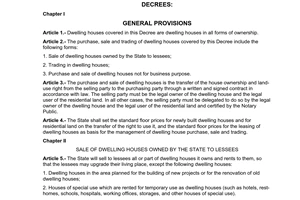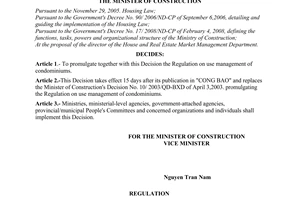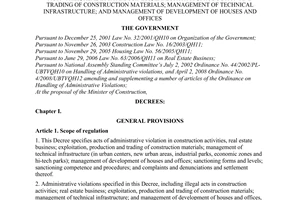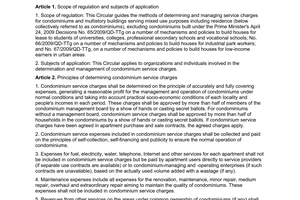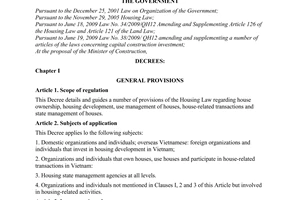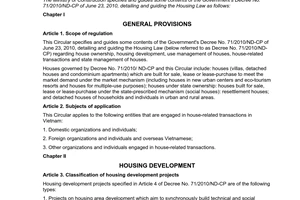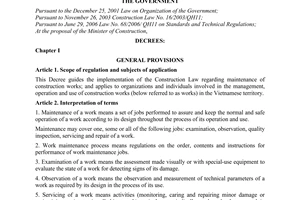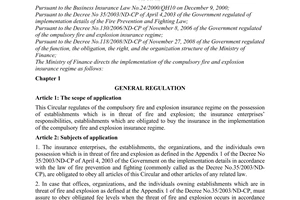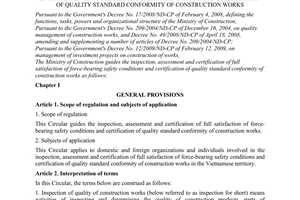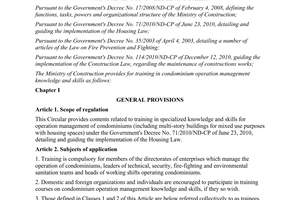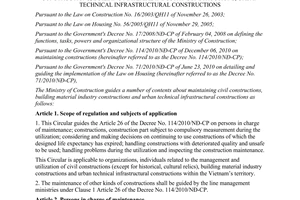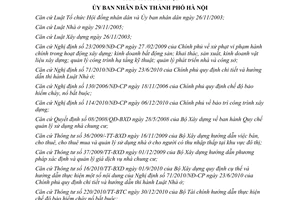Nội dung toàn văn Decision No.01/2013/QD-UBND management and use of condominiums throughout Ha Noi
|
THE
PEOPLE’S COMMITTEE OF HANOI |
SOCIALIST
REPUBLIC OF VIETNAM |
|
No.01/2013/QD-UBND |
Hanoi, January 04, 2013 |
DECISION
ENFORCING THE REGULATIONS ON THE MANAGEMENT AND USE OF CONDOMINIUMS THROUGHOUT HANOI
THE PEOPLE’S COMMITTEE OF HANOI
Pursuant to the Law on Organization of the People’s Councils and the People’s Committees dated November 26, 2003;
Pursuant to the Law on Housing dated November 29, 2005;
Pursuant to the Law on Housing dated November 26, 2003;
Pursuant to the Decree No.23/2009/ND-CP dated February 27, 2009 of the Government on imposing punitive actions against administrative violations in the construction; the real estate trading; the quarrying, manufacturing and trading of building materials; the management of technical infrastructural constructions; the development and management of residential and working office;
Pursuant to the Decree No.71/2010/ND-CP dated June 23, 2010 of the Government on providing instructions on the implementation of the Law on Housing;
Pursuant to the Decree No.130/2006/ND-CP dated November 18, 2006 of the Government on the regulations on the compulsory fire insurance;
Pursuant to the Decree No. 114/2010/ND-CP dated December 06, 2010 of the Government on the maintenance of construction works;
Pursuant to the Decision No.08/2008/QD-BXD dated May 28, 2008 of the Ministry of Construction on issuing the regulations on the condominium use and management;
Pursuant to the Circular No.36/2009/-TT-BXD dated November 16, 2009 of the Ministry of Construction on guiding the sale, rent, hire-purchase, management and use of houses for low income earners at urban areas;
Pursuant to the Circular No.37/2009/TT-BXD dated December 01, 2009 of the Ministry of Construction on guiding the method and management of service charge rate at apartment buildings;
Pursuant to the Circular No.16/2010/TT-BXD dated September 01, 2010 of the Ministry of Construction on detailing and guiding the implementation of several provisions of the Decree No.71/2010/ND-CP dated June 23, 2010 of the Government on providing instructions on the implementation of the Law on Housing;
Pursuant to the Circular No.220/2010/TT-BTC dated December 30, 2010 of the Ministry of Finance on providing instructions on the implementation of compulsory fire insurance;
Pursuant to the Circular No.03/2011/TT-BXD dated April 06, 2011 of the Ministry of Construction on guiding the inspection and certification of full satisfaction of force bearing safety conditions and certification of quality standard conformity of construction works;
Pursuant to the Circular No.14/2011/TT-BXD dated November 25, 2011 of the Ministry of Construction on regulating the occupational training courses for the operation and management of condominiums;
Pursuant to the Circular No.02/2012/TT-BXD dated June 12, 2012 of the Ministry of Construction on guiding several maintenance contents of civil, industrial construction works, building materials and urban infrastructure;
At the request of the Director of Construction Department granted in the statement No.7643/TTr-SXD dated November 13, 2012 and the inspection report No.2716/STP-VBPQ dated December 10, 2012 of the Department of Justice,
HEREBY DECIDES
Article 1. This Decision is attached hereto as “the regulations on the condominium use and management throughout Hanoi".
Article 2. This Decision shall take effect after 10 days from the signing date.
Article 3. The Office Chief of the Municipal People’s Committee; the Heads of regulatory Departments and Agencies; the President of the People’s Committee of districts; the Heads of the management units of condominiums, relevant organizations and individuals shall be responsible for the implementation of this Decision./.
|
|
PP. THE
PEOPLE’S COMMITTEE |
REGULATIONS
THE MANAGEMENT AND USE OF CONDOMINIUMS THROUGHOUT HANOI
(Promulgated together with the Decision No.01/2013/QD-UBND dated January 04,
2013 of the People’s Committee of Hanoi
Chapter I
GENERAL PROVISIONS
Article 1. Governing scope
These Regulations provide for the condominium use and management; rights, obligations and responsibilities of the relevant organizations and individuals involved in the management, use and operation of condominiums throughout Hanoi.
Article 2. Applicable entities
These regulations shall be applied to any condominium developed under the commercial housing project (possessed by many owners) and the social housing project for rent or hire-purchase (possessed by a single owner), including multi-storey buildings for the mixed use purpose. Any apartment that is sold under the Decree No.61/ND-CP dated July 05, 1994 of the Government on the home purchase, sale and trading shall follow particular regulations.
Article 3. Principles of the condominium use and management
1. The condominium use and management shall be based on the principle of self-management that complies with the Law on Housing; the Decree No.71/2010/ND-CP dated June 23, 2010 of the Government on providing instructions on the implementation of the Law on Housing (hereinafter referred to as Decree 71/2010/ND-CP); the Decree No.130/2006/ND-CP dated November 18, 2006 of the Government on the compulsory fire insurance (hereinafter referred to as Decree 130/2006/ND-CP); the Decree No.114/2010/ND-CP dated December 06, 2010 of the Government on the construction maintenance (hereinafter referred to as Decree 114/2010/ND-CP); the Decision No.08/2008/QD-BXD dated May 28, 2008 of the Ministry of Construction on enforcing the regulations on the condominium use management (hereinafter referred to as Decision No.08/2008/QD-BXD); the Circular No.36/2009/TT-BXD dated November 16, 2009 of the Ministry of Construction on guiding the sale, lease, hire-purchase and home use management for low income earners at urban areas (hereinafter referred to as Circular No.36/2009/-TT-BXD); the Circular No.37/2009/TT-BXD dated December 01, 2009 of the Ministry of Construction on guiding the method and management of condominium service pricing (hereinafter referred to as Circular No. 37/2009/TT-BXD); the Circular No.16/2010/TT-BXD dated September 01, 2010 of the Ministry of Construction on detailing and guiding the implementation of several provisions of the Decree No. 71/2010/ND-CP dated June 23, 2010 of the Government on specifying and guiding the implementation of the Law on Housing (hereinafter referred to as Circular No.16/2010/TT-BXD); the Circular No.220/2010/TT-BTC dated December 30, 2010 of the Ministry of Finance on guiding the implementation of compulsory fire insurance regulations (hereinafter referred to as Circular No.220/2010/TT-BTC); the Circular No.03/2011/TT-BXD dated April 06, 2011 of the Ministry of Construction on guiding the inspection and certification of full satisfaction of force-bearing safety conditions and certification of quality standard conformity of construction works (hereinafter referred to as Circular No.03/2011/TT-BXD); the Circular No.14/2011/TT-BXD dated November 25, 2011 of the Ministry of Construction on regulating the professional training for the condominium operation and management (hereinafter referred to as Circular No.14/2011/TT-BXD); the Circular No.02/2012/TT-BXD dated June 12, 2012 of the Ministry of Construction on guiding several maintenance contents of civil, industrial construction works, building materials and urban infrastructure (hereinafter referred to as Circular No.02/2012/TT-BXD); and other relevant laws and provisions of these regulations.
2. The expenditure for the condominium operation and management must be mobilized and monitored in compliance with self-balance, explicit and outright principles; the amount paid for the operation and management expenditures must not exceed the regulated price defined by the People’s Committee of Hanoi.
Article 4. Interpretation of terms (in accordance with the Article 70 of the Law on Housing, Article 49 of the Decree No.71/2010/ND-CP and Article 4 of the Decision No.08/2008/QD-BXD)
1. “Condominium” means a residential building developed with more than two storeys and a built-in system of hallways, stairways, elevators and infrastructural facilities jointly used by different households and individuals. It is divided into parts and areas privately or commonly owned by dwelling households and individuals.
2. “Condominiums owned by different apartment owners” means a complex of apartments owned by more than two apartment owners.
3. “Multi-storey buildings for the mixed use purposes” means a building developed with a lot of storeys and divided into a wide range of dimensions for mixed use purposes (such as office, supermarket, dwelling and others).
4. “Detached condominium” means an apartment building developed in a separate location away from others.
5. “Apartment complex” means a collection of more than two adjacent apartment buildings which have public areas or technical facilities used as common areas.
6. “Project owner” means a person who owns or is authorized to manage the investment capital for the development of apartment buildings under legal regulations; who also directly sells individual apartments to purchasers.
7. “Private parts and interior facilities of an individual apartment in the condominium owned by different apartment owners” includes
a) Interior area of an apartment (including balcony and loggia attached to that apartment) owned by the apartment owner; other indoor areas that the project owner sells separately to each apartment owner or other organizations and individuals;
b) Private areas defined as the private ownership of the project owner (these are retained, not sold and their values are not allocated to the selling price);
c) Private facilities indoors or those located in private areas of that apartment owner or others.
Apartment owners and owners of other areas in apartment buildings as regulated in point a and b of this clause shall be collectively referred to as the apartment owners.
Private areas in the apartment building as regulated in this Clause must be clarified in the sale contract of apartments and other areas.
8. “Common areas of the condominium owned by different owners", including commonly used areas and facilities, shall be regulated as follows:
a) Common areas of apartment owners in the condominium include dwelling space, lobby, stairway, elevator, roof terrace, force-bearing frame, pillar and wall, enclosing wall, partition wall, floor, roof, emergency exit, septic tank, walkway, public playground and others that are not privately owned by apartment owners;
b) The area for community activities and others that are not privately owned by apartment owners as regulated at clause 6 of this Article;
c) Parking area (bicycles, handicapped vehicles and two-wheeled vehicles) must be built in accordance with the engineering standards and can be arranged at the basement or on the first floor or other plots inside or outside the condominium. The car parking lot arranged at the basement must be subject to the construction standards but the project owner can decide whether it is commonly or privately owned by apartment owners as regulated at clause 7 of this Article; in case the value of car parking lot at the basement is allocated to the selling price, it shall be treated as the common area. Otherwise it shall be owned by the developer or project owner.
d) Infrastructural systems shall be arranged within the precincts of the apartment building and linked with each individual apartment.
b) The common area mentioned herein shall be commonly used by apartment owners as stipulated in the provisions of the Law on Housing, the Decree No.71/2010/ND-CP and these regulations hereof.
The common area in the condominium mentioned herein must be clarified in the sale contract.
9. “Management unit of the condominium” means an organization assigned as the direct manager of that condominium.
10. “Apartment dweller” means any organization or individual who is legally using their private parts inside their apartments.
11. “Condominium operation and management enterprise (also called the service provider)” means a unit who has expertise in managing and operating the condominium as well as are incorporated and brought into operation in compliance with the corporate laws.
12. “Condominium maintenance” means a combination of works in order to ensure and maintain the normal and safe operation of the condominium, which conforms to the construction design during the period of usage.
Article 5. Requirements of the condominium upon being brought into operation
Prior to use, operation and management, a condominium must satisfy the following requirements:
1. Achieve the certificate of test acceptance and transfer under the legal regulations on the construction quality control and Article 11 of the Decree No. 71/2010/ND-CP
2. Obtain the certificate of force-bearing safety and full satisfaction of quality standard conformity of construction works as regulated in the Circular No.03/2011/TT-BXD dated April 16, 2011 of the Ministry of Construction on guiding the inspection, verification and certification of full satisfaction of force bearing conditions and certification of quality standard conformity of construction works.
3. Receive the project owner’s inspection and approval of the maintenance processes that are established by the design contractors and equipment suppliers under the provisions of the Decree No. 114/2010/ND-CP and the Circular No.02/2012/TT-BXD
Article 6. Warranty policy (in accordance with the Article 46 of the Decree No.71/2010/ND-CP)
1. In the course of the warranty validity stipulated in the Article 74 of the Housing Law, the project owner must assume their responsibility to maintain every apartment in the condominium unless any damages or losses are caused by natural disasters, wars or the dweller's errors.
2. The warranty content (even applied to multi-storey apartment building serving the mixed use purposes) must consist of repairs and overhauls to any damage to main structures (girders, pillars, floors, ceilings, roofs, walls, coatings, finishes and tiles), attached equipment such as doors, windows, combustible material supply systems; electricity supply system for dweller’s daily use, lighting, water supply, wastewater discharge systems as well as technical handling against the condominium foundation's being settled, collapsed or tipped over on both sides. As for other attached equipment, the apartment seller must carry out the warranty within the warranty period given by manufacturers.
3. In case organizations or individuals who have developed or sold the condominium do not fulfill their warranty obligations as stipulated in the Article 74 of the Housing Law and the Article hereof, the apartment owner shall reserve the right to file a petition to the court; if any damage or loss is caused by the failure to carry out the maintenance, the defaulting organizations or individuals are bound to pay an amount of damages or face a criminal prosecution under legal regulations.
4. The project owner must be responsible to deliver a warranty certificate for both common and private areas and others (a warranty must give the detailed technical drawings of electricity, water, water discharge, communicative devices and gas supply systems, warranted entities, specific terms and conditions, warranty expiration, contact address of the warrantor, rights and duties of apartment owners or dwellers).
Article 7. Insurance policy (in accordance with the Article 67 of the Housing Law; Clause 1, Article 5 of the Decree No.130/2006/ND-CP; Clause 4, Article 4 of the Circular No.220/2010/TT-BTC)
1. High-rise condominium built with more than 5 storeys or building volume of over 5000 cubic meters must have the compulsory fire insurance.
2. Every apartment owner must purchase the compulsory fire insurance for their private owned areas or parts as well as take the responsibility to buy the compulsory fire insurance for common areas. Compulsory fire insurance expenses shall be allocated to the selling price in proportion to the dimension of the private area of each apartment.
3. Expense rate and requirements of compulsory fire insurance in the condominium must abide by the provisions of the Circular No.220/2010/TT-BTC dated December 30, 2010 of the Ministry of Finance on guiding the implementation of the regulations on compulsory fire insurance.
4. The project owner or condominium operation and management unit shall be responsible to allocate and publicize the amount that each apartment owner must pay to achieve the insurance policies for common areas.
5. The purchase of compulsory fire insurance is not in lieu of the responsibilities for the fire prevention and fighting in the condominiums, which must be assumed by management units, apartment owners or dwellers.
Article 8. Controlling the management and use of condominiums (in accordance with clause 1, Article 71 of the Housing Law)
A condominium must be managed by a condominium management board (hereinafter referred to as the Board). The Board must be founded with the participation of apartment owners, dwellers and authorized to become a legal entity to protect legal rights and benefits of apartment owners and dwellers in the condominium.
Within a period of 12 months from the date of condominium’s being brought into operation, the project owner must be responsible to organize the meeting of apartment owners and dwellers (hereinafter referred to as the condominium conference) in order to elect the Board members. The project owner shall be obliged to allow of any relevant content upon which the participants in the conference shall give their consideration and decision.
Whenever a management board has not been officially founded, the project owner is eligible to play their role as a temporary management board.
The mechanism and arrangement of the condominium use and management must comply with Section 1, Chapter II of these Regulations.
Article 9. Establishment and storage of condominium records (in accordance with the Article 8 of the Decree No.08/2008/QD-BXD)
1. The project owner shall be responsible to establish the condominium records, including:
a) As-built drawing for entire construction premises, attached facilities, individual apartments and interior space design;
b) As-built drawing for electricity, water supply and water drainage system, rainwater discharge on the roof, communications systems, garbage collecting system and other underground infrastructures in the condominium and individual house units;
c) Approved maintenance processes and equipment installation designs;
As for any condominium that has been brought into operation prior to the effective date of the Housing Law and provided with none of as-built drawings, the project owner or the condominium operation and management enterprise is responsible for remaking them.
2. Condominium operation and management enterprise and the Board are responsible for storing and maintaining the normal conditions of all drawings and records as stipulated hereof at clause 1 of this Article as well as providing them to the maintenance service contractor when required. In case an official Board has not been founded yet, the project owner or management enterprise takes their responsibility to store all records and documentations which will be then delivered to the official Board after its establishment.
Chapter II
THE CONDOMINIUM USE AND MANAGEMENT
Section 1. THE MECHANISM AND STRUCTURE OF CONDOMINIUM USE AND MANAGEMENT
Article 10. Condominium conference (in accordance with the Article 11 of the Decree No.08/2008/QD-BXD)
1. The condominium conference means the meeting of apartment owners and dwellers in the condominium area. Apartment owners and dwellers are eligible to send their representatives or authorize other persons to the condominium conference.
This conference is likely to be held for a single condominium or an apartment complex. In the context of a single apartment building, the number of participants must amount to more than 50% of total apartment owners and dwellers. In the context of an apartment complex, each apartment building must designate one representative and the total number of participants representing a single apartment building in the conference must make up more than 10% of apartment owners and dwellers in each condominium
2. The condominium conference shall reserve an absolute right to manage the condominium as stipulated by laws on the housing matters and these regulations hereof. The condominium conference shall be entitled to make a decision on the followings:
a) Nominate and elect the Board members; nominate, elect the Board’s supplementary members and remove any Board member in the event of unscheduled conference calls; pass, amend or modify the operation statutes of the Board; commonly agree on the amount of expenditures paid to the Board members and other relevant expenses paid for the Board operations;
b) Pass, revise or amend the rules of condominium management and use for the Board;
c) Seek the common consent to the selection of a qualified enterprise to provide the condominium management and maintenance services.
d) Obtain the common agreement on the reports of condominium operation and maintenance activities as well as financial statements of designated suppliers;
dd) Make proper decisions on other issues regarding the condominium use and management.
All of the condominium conference’s decisions must be made on the majority principle (more than 50% of conference participants) through the voting or secret ballot and shall be then documented.
3. The condominium conference must be held once a year. In some certain cases, the unscheduled conference is likely held if more than 50% of total apartment owners and dwellers send their written request for such a conference to be held or if the Board calls for a conference as well as obtains the written request from 30% of apartment owners and dwellers.
4. It is probable that the condominium conference after two calls fails to get the required number of participants and the lack of participants still recurs in the third call, the People’s Committee of a district where the condominium is located shall be advised to take their decisive role in organizing such a conference.
5. The first condominium conference:
At the length of a defined period stipulated by Article 8 in these Regulations and after selling 50% or more of apartments (including the number of apartments that the developer retains), the developer is obliged to organize the first condominium conference. The first conference shall be held following the processes below:
5.1. Project owner shall allow for
a) The conference schedule and agenda (proposed organization board, draft statutes and regulations of board member election in that conference);
b) The rules of condominium use and management according to the Circular No.16/2010/TT-BXD;
c) The written introduction of project owner’s representative to hold the position of vice head in the Board;
d) Draft of the operation statutes abided by the Board.
5.2. Upon completion of the contents mentioned herein at point 5.1 of this Clause, the project owner must contact the People’s Committee of a commune where the condominium is located in order to hold the preparatory meeting. Preparatory meeting shall be attended by the following participants:
a) The President of the People’s Committee of a commune;
b) Sheriff of police department of a commune;
c) Secretary of a communist party’s branch, head and vice head of residential group (in case a residential group has been officially founded and these persons are apartment owners as well) or representatives of apartment owners or dwellers (in case the communist party's branch and residential group has not been founded yet);
d) Temporary Board (if any);
e) Project owner.
5.3. The preparatory meeting shall be responsible to prepare any available contributed opinion and content for the condominium conference and the following issues must be discussed and approved:
a) Consent to the method and define the responsibility for the collection of opinions from apartment owners and dwellers in terms of the contents and issues that will be discussed in the conference (such as the rules of condominium use and management and the operation statutes of the Board); the required procedures for the authorized participants;
b) Agree on the conference schedule and other relevant contents as well (if applicable);
c) Nominate any eligible person to the Board.
5.4. The organization of condominium conference:
a) Within a period defined by the resolution of the preparatory meeting, the project owner shall be responsible to collect all contributed opinions and complete necessary contents that will be discussed prior to the conference's being held. The conference attendees are subject to clause 1 of the Article hereof while the People’s Committee of a district and the People’s Committee of a commune where the condominium is located are also invited as well;
b) The condominium conference shall be entitled to decide the issues as prescribed in clause 2 of the Article hereof.
6. Several particular cases in which the first conference shall be organized:
a) In case any condominium in the resettlement development program has been built and funded by the state budget or the purchase order of Hanoi’s developmental investment fund, Hanoi People’s Committee shall authorize its designated unit to fulfill the responsibility assumed by the project owner to organize the first condominium conference.
b) In case the project owner of a condominium has not been defined yet, the People’s Committee of a district takes full responsibility to organize the first condominium conference.
Article 11. The accreditation and recognition of the Board (in accordance with Clause 4 of Article 12 stated in the Decree No.08/2008/QD-BXD)
Within a period of 10 days from the Board’s official election, the Board shall be responsible to submit the application documents herewith to obtain its legal accreditation at the administrative document reception and settlement division of a district where the condominium is located, including:
The minutes of the condominium conference;
The minutes of the Board’s meeting to elect its head and vice head;
The rules of condominium use and management that have been approved in the conference.
Within a period of 10 days on receipt of valid application documents, the People’s Committee of a district must be responsible to grant the accreditation to the Board.
Article 12. The condominium management Board (in accordance with the Decree No.08/2008/QD-BXD; the Article 2 stated in the Circular No.37/2009/TT-BXD)
1. The Board members shall be defined as follows:
a) In respect of the condominium owned by different apartment owners, the Board membership shall consist of those who represent apartment owners, dwellers, project owners or management service contractors. The number of 05 to 15 members shall be elected to join the Board, depending on specific conditions at each condominium and apartment complex. The organization structure of the Board shall include 01 Head, 01 or 02 Vice Head(s), one of whom must be a person authorized by the project owner to join the Board.
In case the condominium has determined its communist party's branches and residential groups, the Board members shall be elected from apartment owners who also work as their secretary and head respectively; authorized representatives of apartment owners or dwellers and the project owners.
Within a period when they are serving as the Board members, if there is/are one or several members' request for leaving the Board, the Board shall recommend other persons to join the Board after referring to the opinions from residents living in the condominium; in case the leaving member is the Board’s Head or Vice Head, the Board shall call for an unscheduled conference to elect another replacement for such a member; the People’s Committee of a district where the condominium is located shall be responsible to adjust the list of the Board members after receiving the required application documents from the Board. Deadline for the consideration over application documents is regulated in the Article 11 of these Regulations. Whenever the project owner enters into a merger or transfers their rights and duties to another enterprise, the latter shall be responsible to assign their authorized person to join the Board. The project owner shall be entitled to retreat from the Board whenever the current Board has been running well and the condominium management has been practiced in a disciplined and orderly manner. This must be approved by the condominium conference and the People’s Committee of a district.
b) In respect of the condominium owned by a single owner, the Board membership shall include that owner and the representative of apartment dwellers.
2. Rights and responsibilities held by the Board
a) Organize the next condominium conferences; compile a report on the condominium use and management between two conferences;
b) Protect the legal rights and benefits for the dwellers during their condominium use; examine and encourage dwellers to comply with the rules of condominium use and management as well as other laws on the condominium management and use; provide favorable conditions for the condominium operation and management enterprise to properly perform their contractual tasks;
c) Collect and analyze the dweller’s opinions and suggestions regarding the condominium use and management to seek suitable solutions from the condominium operation and management enterprise, competent authorities, relevant organizations and individuals;
d) Enter into the service supply contract with the condominium operation and management enterprise as well as the maintenance contract with the engineering enterprise who matches with the required maintenance contents (the selection of these enterprises must be approved by the condominium conference); monitor and supervise the operation management and maintenance of the condominium according to terms and conditions stated in the aforementioned contracts; carry out the acceptance test over the scope of contractual works, make due payments and finalize such contracts;
dd) Authorize the condominium operation and management enterprise to collect the service charges;
e) Check all financial statements on the operation, management and maintenance of condominiums released by the service providers and reported to the condominium conference as stipulated in point a of this clause;
g) Work closely with local authorities and residential groups to promote the civilized lifestyle and uphold the social safety and order at their condominium;
h) Collect the apartment dweller’s opinions as significant criteria to assess the quality of management and operation services provided by the contracting enterprise every 6 months;
i) Carry out other tasks assigned by the condominium conference;
k) Get access to the amount of financial supports and other reasonable expenditures used for the operation purpose of the Board;
m) Hold the voting or secret ballot by which the rate of condominium service charge shall be determined;
n) Deter its members from organizing any affiliate, remove any member or designate any Board member at its discretion.
3. The Board shall base its operation on the collective principles and majority decisions. In case the voting rate achieves only 50% of the ballot, the Board's Head shall make final decisions.
4. The Board shall have maximum 03-year tenure from the signing of the People's Committee of a district.
5. In case of the condominium owned by a single owner, the Board shall take the responsibility to call for the consecutive condominium conferences as well as assume its rights and duties as stipulated in point b, c, g, i and k of the Article hereof.
Article 13. Project owner’s involvements in the condominium use and management (in accordance with the Article 13 of the Decision No. 08/2008/QD-BXD; the Article 6 of the Circular No.37/2009/TT-BXD)
1. As for the condominium owned by different apartment owners, the project owner shall have rights and responsibilities as follows:
a) Choose and sign contracts with any proper enterprise to operate and manage the condominium (regardless of the project owner’s affiliates) from the condominium’s being brought into operation to the Board's coming into existence. Recommend the operation and management service contractor to seek the first conference's consent;
b) Collect the maintenance service charge for the common areas according to Article 51 of the Decree No.71/2010/ND-CP and Article 20 of these Regulations as well as hand over the task to the designated contractor as stipulated in the Article 21 of these Regulations;
c) Transfer the management of exterior infrastructural systems to the local competent authorities in compliance with the legal regulations. As regards any condominium serving the mixed use purposes, the project owner shall be responsible to transfer the aforementioned infrastructural facilities whenever every private area has been sold out to other apartment owners;
d) Provide all of user’s manuals for the interior equipment and facilities to the dwellers;
dd) Deliver 01 set of housing documentations under the Article 9 of these Regulations to the Board for storage;
e) Perform the active role in organizing the first conference according to the Article 10 stated in these Regulations;
g) Authorize their representatives to join the Board according to the Article 10 of these Regulations.
2. As regards the condominium owned by a single owner, the project owner shall perform the assigned tasks or fulfill their commitment to the condominium use and management with apartment owners.
Article 14. The condominium management service contractor (in accordance with Article 14 of the Decision No.08/2008/QD-BXD and Article 6 of the Circular No.37/2009/TT-BXD)
1. The condominium operation and management service contractor is a unit who has expertise in operating and managing the condominium and their scope of businesses complies with the corporate laws. This contractor can directly carry out only one, several or the whole of the management and operation works in the condominium.
2. This contractor shall be entitled to any policy reserved for a public service provider according to current laws and regulations.
Section 2. THE MANAGEMENT OF CONDOMINIUM OPERATION
Article 15. The operation and management of condominiums (in accordance with Article 5 of the Decision No.08/2008/QD-BXD)
1. The operation and management of condominium shall be inclusive of:
a) Manipulate and maintain the normal operation of technical systems and facilities (including elevator, water pumping station, standby electric generator, water supply and discharge system, lighting, gasoline supply, communications, broadcast, internet, lightning conductor, firefighting equipment and others).
b) Supply various services such as security guard, cleaning, housekeeping, garbage collecting, ornamental plant gardening, insecticide spraying and others.
2. The operation and management service of the condominium must be implemented by the contracting service provider in compliance with any contractual services signed with the Board after its establishment. In case the Board has not been established yet, the management and operation services shall be carried out by the project owner (if qualified) or by a contractor appointed by the project owner.
Article 16. The agreement of condominium operation and management (in accordance with Article 16 of the Decision No.08/2008/QD-BXD)
1. This agreement shall define the following main contents:
a) Full name, address and authorized person of contracting parties;
b) Contracted dimension and coverage of common parts indoors and outdoors;
c) Scope of works and requirements of quality, quantity, time and location;
d) Fees and charges;
dd) Contract execution expiry
e) Rights and responsibilities held by contracting parties;
g) Other relevant terms and conditions.
2. The execution expiry mentioned at clause 1 of this Article shall be 02 years at minimum. The contract may be granted an extended period of less than 02 years.
3. The cancellation and termination of this service contract:
a) This contract shall be unilaterally cancelled as either party is in breach of the agreed terms and conditions;
b) The contract termination occurs when it comes to the expiry date or when both parties agree on terminating the contract.
4. Acceptance inspection, payment, financial statement and finalization of this contract must abide by governing laws and regulations.
Article 17. Rights and duties of the operation and management enterprise (in accordance with Article 16 of the Decision No.08/2008/QD-BXD; Article 2 and 6 of the Circular No.37/2009/TT-BXD)
1. Supply the operation and management services according to contracting terms and conditions; ensure the compliance with safety criteria, required standards, current rules and regulations.
2. Sign the agreement with other contractors according to point b, clause 1 of the Article 15 stated in these Regulations (if applicable); monitor and supervise the serves supplied by such contractors to ensure their compliance with the contracts.
3. Send a written notification about significant requirements that the dwellers must take into consideration before usage; provide manuals for the installation of equipment attached to the common facilities of the condominium.
4. Carry out the periodical inspection over attached parts and components to facilitate their operation and management services as well as timely detect any damage.
5. Take immediate actions in preventing any risk that may cause losses to the dwellers as well as carry out the repair and maintenance of any damaged items or facilities used as common properties, which aims to maintain the normal operation in the condominium.
6. Collect monthly charge for these services according to the Article 18 stated in these Regulations after receiving the authorization from the Board. In respect of a condominium owned by a single apartment owner, collecting an amount of this charge for the condominium operation and management service shall adhere to all terms and conditions agreed between the project owner and dwellers.
7. Cooperate with the Board to request water and electricity supply agencies to suspend the supply if the dwellers, for whatever reasons, fail to timely pay a full amount of the management service charges as well as are in breach of regulations defined in the Article 24 of these Regulations without any necessary remedies.
8. Serve the active role in computing and determining the rate of service charges according to instructions provided in the Circular No.37/2009/TT-BXD based on the method of voting and secret ballot. In case a condominium has not yet established the Board, collect opinions and obtain consent in writing from more than 50% of dwellers.
9. Compile and send a report on the condominium operation and management to the Board every 6 months and work with the Board to collect the dweller's opinions on such services.
10. Liaise with the Board and residential groups to protect social safety and order in condominiums as well as other relevant issues that arise during the condominium operation and management.
Article 18. The budget for the condominium operation and management (in accordance with Article 17 of the Decision No.08/2008/QD-BXD Article 2 and 3 of the Circular No.37/2009/TT-BXD)
1. The expenditures for the condominium operation and management under the Article 15 of these Regulations shall be defined by the project owner to comply with the general service price prescribed in the Circular No.37/2009/TT-BXD
2. The condominium service price shall be inclusive of:
a) Service charges include direct cost, general management expense covered by the operation and management service provider and others paid to the Board (if applicable);
b) Reasonable net profit margins;
c) Value-added tax.
3. Costs and expenses accrued to the condominium service price shall adhere to the Article 3 of the Circular No.37/2009/TT-BXD
4. In respect of a condominium owned by a single apartment owner, the management and operation budget shall be controlled by the project owner unless there are any other agreements between the dwellers and project owner. In case of a condominium commonly owned by different apartment owners, the operating expenditures shall be collected from these ones on the principle that a sufficient amount of expenses shall be calculated. The rate of payment for the service charge in the condominium shall be calculated in month unit and distributed to each apartment owner's private area as well as collected from the dwellers once a month (regardless of the private areas that the project owner has not yet sold or the apartment owners have not used).
In respect of a condominium providing value-added services (such as steam bath, personal swimming pool or others) other than those regulated at clause 1, Article 15 of these Regulations, given the written agreement on the service charge between the project owner and condominium purchaser stated in the sale contract, the amount of payments shall be collected as defined in this contract.
5. Car, bicycle and motorbike parking fees shall be kept as a separate account and used to make up for the condominium operation and management services.
6. As for costs incurred by the usage of fuel, energy, water and others defined in separate contracts with each dweller, the dweller shall pay directly to these service providers. In case of water and electricity consumption that has not been defined by separate contracts, the dwellers must pay for their consumed amounts which are inclusive of any loss.
7. Costs incurred by security, social safety and order, firefighting and prevention, parking lot, cleaning and housekeeping services shall be regulated by the People’s Committee of Hanoi;
8. Irregular service charges (if any) such as public telephone, asset custody and others shall be agreed between the service users and service providers.
Section 3. CONDOMINIUM MAINTENANCE
Article 19. Condominium maintenance principles (in accordance with the Article 18 of the Decision No.08/2008/QD-BXD);
1. Apartment owners shall be responsible to maintain their private areas on their own. In case the dwellers are not the apartment owners and like to carry out the maintenance for the private areas, this must receive the written consent from the apartment owners. Apartment owners shall be responsible to pay a full amount of expenses for the maintenance of common areas as prescribed herein these Regulations.
2. The maintenance for common areas, technical infrastructural systems and commonly used equipment shall be carried out by a legal organization who has expertise in the engineering or construction works that match with the aforementioned. This maintenance must abide by the instructions and manuals provided by inventors and manufacturers as well as processes and regulations enforced by the competent State agencies.
The maintenance for spaces on the roof and outside the enclosing walls (a common area) must obtain the construction license issued by the competent authorities under the authorization of the Hanoi People’s Committee.
3. The maintenance works must ensure safety for dwellers, workers, properties, environmental sanitation, landscapes and architectural spaces in the condominium.
4. In case any condominium has not established or approved the regulated maintenance processes, the project owner or the current management contractor shall be responsible to maintain the condominium as stipulated in Article 15 of the Decree No. 114/2010/ND-CP and the Circular No.02/2012/TT-BXD
Article 20. Expenditures for the maintenance of common areas (in accordance with Article 51 of the Decree No.71/2010/ND-CP; Article 19 of the Decision No.08/2008/QD-BXD)
1. In case the project owner has signed the sale contract of individual apartments or other condominium spaces from the effective date of the Housing Law, the project owner must contribute 2% of their selling amount. This amount shall be added to the total selling amount of individual apartment or other condominium areas that purchasers must pay, which shall be clearly defined in the sale contract.
As for any condominium area that the project owners retain and do not sell (exclusive of the common areas), the project owner must contribute 2% of total monetary value of that area that is defined on the basis of the highest selling price of an individual apartment.
2. In case the project owner has signed the sale contract of individual apartments or other condominium spaces prior to the effective date of the Housing Law and the project owner has not yet collected 2% of the selling price, the owner of individual apartments and other condominium spaces shall assume their responsibility to contribute an amount of expenditures to have the common areas maintained. This amount shall be collected only if the maintenance works are required and defined with specific maintenance contents.
3. In case the amount of maintenance expenditures as stipulated in clause 1 and 2 of this Article is not sufficient for the maintenance of common areas, apartment owners shall be responsible to contribute additional amount in proportion to the private areas of each apartment owner. In case a condominium must be demolished and the amount of expenditures mentioned in clause 1 of this Article is still remaining, the remainder shall be used as a resettlement supporting the course of reconstructing that condominium or allocated to the maintenance fund for later use in the reconstructed condominium.
4. 4. In respect of a hired and purchased apartment, the contributed amount of maintenance expenditures for the common areas shall also be defined under clause 1, 2 and 3 of this Article.
Article 21. The management of maintenance expenditures for the condominium's common areas
(In accordance with Article 20 of the Decision No.08/2008/QD-BXD)
1. As for the maintenance expenditures regulated at clause 1, Article 20 of these Regulations, the project owner shall be responsible to open deposit accounts at a commercial bank for each condominium at the interest rate which is not less than the interest rate of non-term deposits since the condominium operation as well as directly manage these accounts until an official board has been established. After the Board has been officially founded, the project owner shall notify the Board of such deposit accounts to monitor, supervise and utilize them in compliance with the financial laws as well as liaise with the Board to work with the bank to transfer these accounts to the enterprise that has been designated by the Board to supply the operation and management services in the condominium.
In case the management and operation service provider has been changed, the previous service provider in association with the Board must transfer these accounts to the current service provider.
Interest amounts generated from these banking accounts must be accrued to the maintenance expenditures.
2. Acceptance inspection, payment, financial statement and finalization of the maintenance contract must abide by the governing laws on the construction and civil contract.
3. Project owner together with the operation and management service provider must establish a bookkeeping system to keep record of the maintenance expenditures and cooperate with the Board to examine and balance the receipts and liabilities under the current financial laws; explicitly explain the receipts and expenditures of the maintenance budget to the dwellers in the annual condominium conference.
Section 4. RIGHTS AND OBLIGATIONS RESERVED BY APARTMENT OWNERS, DWELLERS AND PROHIBITED ACTS DURING THE CONDOMINIUM USE
Article 22. Rights and obligations of apartment owners (in accordance with the Article 21 of the Decision No.08/2008/QD-BXD)
1. With respect to the condominium owned by different owners
a) Reserve the right to use the common areas as stipulated in these Regulations;
b) Request the project owner (even their affiliates) or the current management contractor, whether a management board has been established or not, to provide information and publicize all relevant contents regarding the condominium use and management;
c) Strictly observe the decision made by the condominium conference;
d) Assume their responsibility to maintain their own space; make a full and timely payment for the expenditures used for operation, management and maintenance services for the common areas as well as pay other costs according to legal regulation and these Regulations;
dd) Provide favorable working conditions for those who are in charge of the operation and maintenance of the common areas in the condominium;
e) Strictly comply with rules and regulations on the management of condominium usage; abide by regulations on firefighting and prevention, public sanitation, social security and order; detect and immediately notify any violation in the condominium;
g) Carry out the restoration or indemnification for any loss and damage that they have caused to the common space or other dwellers’ private areas;
h) Maintain and utilize their private areas with reference to their designed functions and use purposes;
i) Send the project owner (event their affiliates) or the current management contractor a list of dwellers to register their regulated temporary residence and absence with the local police of the commune while they have not already registered their permanent residence in the condominium;
k) In the event that there are demands for the maintenance of private areas, the project owner or legal dwellers must submit a written notification to list out their maintenance works such as construction items, time, method and others related to their construction in order to minimize the impacts on other apartments as well as the whole condominium; all of maintenance and repair works shall only be carried out after achieving the guiding documents from the official Board or the operation and management service provider.
2. 2. As for a condominium owned by a single owner, the apartment owner shall be responsible to comply with regulations stated in the Article 68 of the Housing Law.
Article 23. Rights and obligations of dwellers who are not apartment owners (in accordance with the Article 22 of the Decision No.08/2008/QD-BXD)
1. Be entitled to legally use the private area and reserve the rights regulated in point a, b of clause 1 of Article 22 in these Regulations;
2. Request the apartment owner to provide the rules of condominium usage and management as well as other relevant information;
3. Attend the condominium conference and contribute an amount of money for the operating cost in the condominium if this contribution has been agreed with the apartment owner;
4. Fulfill their obligation to comply with point c, dd, e and g of clause 1 in the Article 22 of these Regulations.
Article 24. Prohibited acts
(In accordance with Article 23 of the Decision No.08/2008/QD-BXD)
1. Expand or appropriate dwelling space or damage the common property or facilities in any form; drill, renovate and dismantle or change the force-bearing structure, infrastructural system, commonly used equipment and exterior architectural space in the condominium;
2. Illegally divide and transform the common space or areas;
3. Create excessive noise and cause the adverse effects on the condominium safety and security;
4. Litter or scatter rubbish, waste water, exhaust and toxic substance around the condominium; cause infiltration, let liquids in the apartment or contaminate the living environment; raise animals within the common space or areas;
5. Exercise the illegal advertisements and drawings or other prohibited acts under laws; use unreasonable material for the finish outside the apartment and condominium; change the structure and design of the private space or areas (such as build a concrete wall, move equipment and infrastructural systems attached to the common area, or drill and widen the apartment space in any form);
6. Use or allow others to use their private space or private parts to serve the illegal purposes.
7. Raise animals within a private area (or the private parts), which can have negative impacts on life security, landscape and environment of other apartment dwellers as well as common areas (raising ornamental animals must abide by laws);
8. Trade highly inflammable and explosive goods (welding, gasoline, explosive substance and other hazardous goods)
9. Supply services that cause excessive noise and environmental pollution (such as karaoke bar, dancing club, motorbike and car repair, slaughterhouse and other services);
10. Misuse the expenditures intended for the operation, management and maintenance services.
Article 25. These prohibited acts under the Article 24 of these Regulations must be publicly disseminated to any proper organizations and individuals by the Board or project owner or apartment owners.
Chapter III
TRANSITIONAL SETTLEMENT
Article 26: Definition of common and private areas in the condominium
1. In case the project owner has sold their apartments since August 08, 2010 (the effective date of the Decree No.71/2010/ND-CP) common and private areas must abide by the regulations stated in clause 7, 8 of the Article 4 in these Regulations. In case the project owner has not yet defined the location and boundary of common and private areas, as stipulated in clause 7, 8 of the Article 4 in these Regulations, on the drawings enclosed in the sale contract, they have to provide a supplementary one and inform the apartment sellers.
2. If the project owner has sold their apartments since July 1, 2006, the regulations stated in clause 7, 8 of the Article 4 in these Regulations shall be applied. In case the car parking lot is located at the basement according to the approved investment project but the project owner has not yet allocated the value to the price of selling apartments and other private areas, it shall be considered as the private property of the project owner. In case the project owner has not yet defined the location and boundary of common and private areas, as stipulated in clause 7, 8 of the Article 4 in these Regulations, on the drawings enclosed in the sale contract, they have to provide supplementary ones and inform the apartment sellers.
3. If the project owner sold apartments before July 1, 2006 (the effective date of the Housing Law), has not allocated the construction cost of bicycle and motorbike parking lot, community hall and other areas (if any) to the selling price as well as has not defined the location and boundary of common and private areas or parts as stipulated in the regulations at point 7, 8, Article 4 in these Regulations, on the drawings enclosed in the sale contract, the project owner must employ an auditing unit to work with the Board to inspect and find the method to allocate this amount of costs to the selling price of private areas. This allocation method shall be approved by the condominium conference and become a basis for the apartment owner's making their payment for these costs to the project owner in order to transfer this area to the common part as stipulated at clause 7, 8 in the Article 4 of these Regulations.
4. If the community area has not been located in the approved construction project of the condominium, the project owner is obliged to reserve their private area that is retained to arrange a community hall provided that it satisfies the minimum requirements of 0.8m2 which is multiplied by the number of apartments but must be larger than 36m2; the apartment owners are obliged to pay relevant costs based on the construction price and equally dividing principle.
Article 27. In terms of the service charge rate
If the agreement on the service charge exists in the sale contract, this agreement must be observed. After the Board has been found as well as common and private areas have been defined as stipulated in Article 26 of these Regulations, the service charge rate shall be defined according to Article 18 of these Regulations.
Article 28. In terms of the resettlement condominium
1. The resettlement condominium is developed and financed by the state budget and the purchase order from the development investment funds in Hanoi, Hanoi People's Committee shall reserve the right to appoint the management and operation service provider as well as authorize this enterprise to play the role as the project owner in performing assigned tasks as regulated in these Regulations.
2. When the resettlement apartment has been sold at the price which is inclusive of the maintenance expenditure, the municipal budget shall allocate this maintenance expenditure to the operation and management service provider to open a deposit account at a commercial bank. If the selling price has not yet included the maintenance expenditure or the apartment has been sold before the effective date of the Housing Law without collecting 2% of the selling amount, apartment owners are obliged to pay the maintenance cost according to regulations issued before August 08, 2010, the amount of maintenance expenditures for common and private areas shall comply with the Article 20 of these Regulations. The management of the maintenance expenditures for the common areas shall adhere to the Article 21 of these Regulations;
3. The current management contractor in association with the People’s Committee of a district shall propose a cultural community hall for each condominium, which shall cover an area as regulated at clause 4 of Article 26 in these Regulations. Concurrently, they also have a look at the area intended for the trading and services on the first or second floor to draw up a plan to build kindergarten, civil defense office and commercial stores to serve the living demands while the remaining part shall be for rent according to legal regulations.
4. Tenants who use the rented areas for their trading and service activities shall be responsible to pay for the service charges as regulated in the Article 18 of these Regulations.
5. A rental amount paid for this rented area shall be contributed into the state budget while a part of this amount shall support total expenditures for the condominium operation and management. The Department of Finance shall take the leading role in associating with the Department of Construction to propose a rate of supporting amount for each condominium for Hanoi People’s Committee’s consideration and decision.
Chapter IV
DISPUTE SETTLEMENT AND SANCTION AGAINST VIOLATIONS
Article 29. Dispute settlement (in accordance with Article 25 of the Decision No.08/2008/QD-BXD)
1. Any dispute related to the ownership of apartments shall be solved by the court.
2. The dispute related to the ownership of apartments shall be reconciled but must ensure the compliance with these Regulations; if the reconciliation fails, the court shall be requested to make their final decision.
3. Any dispute that arises in the civil contracts of the use, operation and management services in the condominium under these Regulations shall be solved in compliance with laws on the civil contracts.
Article 30. Sanction against violations (in accordance with Article 26 of the Decision No.08/2008/QD-BXD)
1. Any violations against these Regulations shall be subject to legal punitive sanctions under the legal regulations on the violation punishment of home use and management.
2. People’s Committee of a district shall carry out the periodical or sudden inspection over the condominium use, operation and management throughout Hanoi and impose any sanction against these violations according to their assigned authority.
3. Those who intentionally abuse their power to violate the regulations on the condominium use and management, depending on the severity, shall be punished under the administrative sanctions or criminal prosecution. The violating person causing any material loss must be subject to any indemnity.
Chapter V
IMPLEMENTATION
Article 31. Responsibility for the implementation held by regulatory bodies and People’s Committees at all administrative levels
1. Department of Construction:
Consult with Municipal People’s Committee to implement their state management on the use and operation of condominiums throughout Hanoi; organize training courses and provide instructions to relevant organizations and individuals to implement these Regulations; liaise with Department of Finance and other relevant agencies to agree on the ceiling price of the condominium services, which will be then inspected and modified to match with practical conditions and submitted to the Municipal People's Committee for approval in order for the project owner and service provider to comply with related regulations on the service price; check, inspection and deal with any violation against the usage, operation and management of the condominium under proper competence and legal regulations.
2. Department of Finance
Take the leading role in working with the Department of Construction to carry out the allocation of maintenance expenditures for the condominium as stipulated in Article 20 of these Regulations; provide instructions to the current service provider to ensure the fulfillment of financial obligations in the course of their supplying operation and management services in the condominium as stipulated by laws.
3. Municipal Police Department:
Direct and provide instructions to Police Division of a district, commune where the condominium is located to carry out the administrative management, maintain the social security and order and inspect the permanent, temporary residence and absence therein.
4. Fire brigade:
Provide instructions to the project owners, service provider and board to implement the regulations on fire and explosive fighting and prevention at the condominium.
5. Department of Natural Resources and Environment:
Provide instructions to the project owners to prepare application documents to apply for the certification of land use right and house ownership to those who own apartments and other attached areas as stipulated by laws.
6. People’s Committee of a district:
a) Propose a plan to assign the administrative administration tasks at the area where the condominium is located, which will be then submitted to Municipal People’s Committee for approval as well as carry out their management over the technical infrastructural systems for any housing and new urban project according to legal regulations and their authority assigned by Municipal People’s Committee;
b) Provide instructions to hold the condominium conference and implement their competent authority as stipulated by these Regulations;
c) Take the decisive role in approving the service charge rate in the condominium whenever any dispute over this occurs in the area under their control;
d) Issue the certificate of land use right, home and apartment ownership for any individual in the condominium throughout Hanoi in compliance with current laws and regulations;
dd) Supervise, examine and detect any difficulty or dispute that is likely to arise over the use, operation and management of condominiums to solve it under their competent authority; if the matter is beyond their authority, they are entitled to propose any possible solution to the municipal People’s Committee for their consideration and final decision.
8. People’s Committee of a commune:
a) Disseminate and encourage households and organizations to be aware of and comply with laws and these Regulations of regulations on the use and management of condominiums;
b) Supervise, examine and detect any difficulty or dispute that is likely to cause over the use, operation and management of condominiums; solve any dispute and deal with violations against the construction order (if any) under their competent authority; if the matter is beyond their authority, they are entitled to propose any possible solution to the municipal People’s Committee for their consideration and final decision;
c) Liaise with the project owner and enterprise to manage and operate the condominium as well as with the Board to solve any issue regarding the use, operation, maintenance and management of condominiums under their competent control;
d) Provide convenience for the operation and management enterprise as well as the Board to implement their assigned tasks and supply their services;
dd) Carry out the regulated management and use of community hall in the condominium.
Article 32. Implementation provisions
In the course of implementing these Regulations, any difficulty that arises should be reported in writing by those who are involved in the use, operation and management of condominiums while any proposed amendments and adjustments shall be submitted to the Department of Construction to compile a complete report sent to the Municipal People’s Committee for consideration./.
------------------------------------------------------------------------------------------------------
This translation is made by LawSoft and
for reference purposes only. Its copyright is owned by LawSoft
and protected under Clause 2, Article 14 of the Law on Intellectual Property.Your comments are always welcomed
